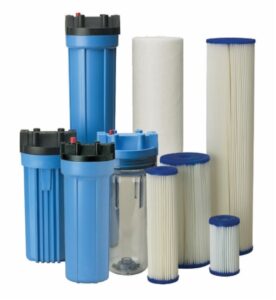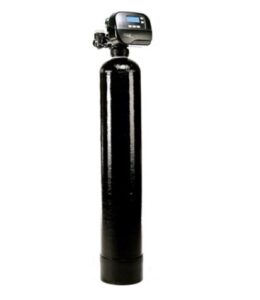
CARBON FILTERS
CARBON FILTRATION is a method of filtering that uses activated carbon to remove chemicals (such as chlorine, volatile organics and others) and some bad tastes and odors from water. Catalytic carbon is a specialized carbon media effective in removing Chloramines from the water, a compound of chlorine and ammonia increasingly being used in place of chlorine as secondary disinfection in public water supplies.
How does it work?
With a carbon filter process, water passes through activated carbon, which is porous, trapping certain particles that are attracted to the porous material in a process known as adsorption (not absorption)
At some point, adsorption capacity is exceeded and the filter must be changed in order to be effective. Coal is the most common element used to produce carbon filters, but manufacturers will often enhance carbon filters by using other elements and blends of materials such as coconut shell and other materials. These materials are “baked” at extremely high temperatures creating very large numbers of pores within the materials, giving them large capacities for the adsorption process. This “baking” is the “activation” process that makes these materials so effective at removing certain impurities from the water.
Effectiveness really depends on what the filter is designed to achieve in filtering out waterborne particles. Carbon filters vary in size, design, function, efficiency and life cycle and different activated carbon filters are designed to allow a certain flow rate of water through the filtering process as well.

Backwashing Activated Carbon System
WHAT DOES IT REMOVE
According to EPA (the Environmental Protection Agency in the United States) Activated Carbon is the only filter recommended to remove all 32 identified organic contaminants including Trihalomethanes (THMs – by-products from chlorine). The same is true for all 14 listed pesticides and 12 herbicides. Carbon filters are also effective at removing a variety of odors and bad tastes from the water.
Carbon Filters Micron Rating & Effectiveness
Carbon filter effectiveness is measured in terms of size of particles they can attract.
I.e. 1 micron, 5 micron, 10 micron, etc.
A water treatment professional can determine the most appropriate micron (mm) rating for your application.

MICRON RATINGS
Filter Rating
There are typically two ratings to determine the effectiveness of carbon filters. They are as follows:
Nominal Filter rating – a filter that will remove 85% of the particles of a specified size (in microns) and larger. A filter rated at 1 micron will remove 85% of particles that are 1 micron or larger.
Absolute Filter rating – a filter that will remove 99.9% of particles of a specified size (in microns) and larger. A filter rated at 1 micron will remove virtually all particles 1 micron or larger.
Carbon filtration can help remove harmful chemicals from your water and H2O Care can install a whole house water filter, an under-counter water filter or any other solution that will solve your specific situation. Give us a call at (800) 539-1100 or contact us here.
H2o Care, Inc. is an established, full service water testing and water filtration systems installation & services firm established in 1989, with offices in Middleton, Stow & Lakeville, Massachusetts and a service depot in Plymouth. See our published articles on common contaminants at publications. Contact us at [email protected] or by calling us at 800-539-1100.

Group Photo at Middleton Facility
